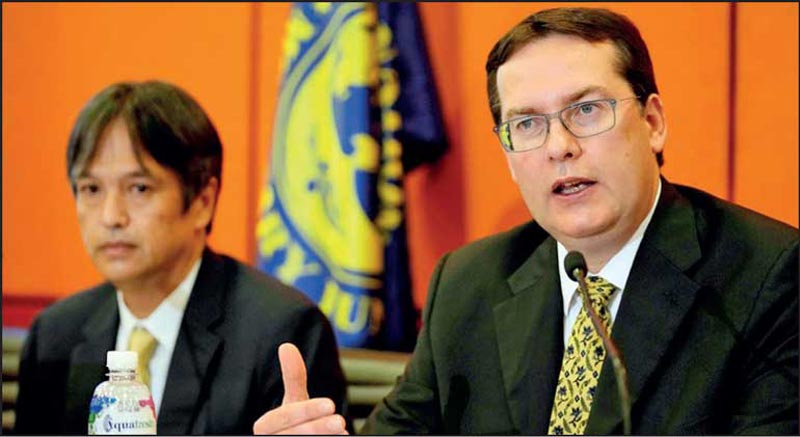
IMF’s Senior Mission Chief for Sri Lanka Peter Breuer
The International Monetary Fund (IMF) yesterday stressed the importance of timely conclusion of agreements between Sri Lankan authorities and the official creditors on the external debt restructuring.
“It is now important for the Sri Lankan authorities and the official creditors to sign the respective Memoranda of Understanding. Timely implementation of the agreements, together with reaching a resolution with external private creditors, should help restore Sri Lanka’s debt sustainability over the medium term,” IMF’s Senior Mission Chief for Sri Lanka Peter Breuer told journalists yesterday.
He said that the IMF staff will continue to assist the authorities with creditor coordination in line with the IMF’s policies.
The IMF commended Sri Lanka for reaching important milestones in putting debt on the path towards sustainability. Sri Lanka’s agreements-in-principle with the Official Creditors Committee and the Export-Import Bank of China on debt treatments are consistent with the program targets, IMF said.
Remarks by Breuer were after the IMF Executive Board on Tuesday completed the first review under the 48-month Extended Fund Facility with Sri Lanka, providing the country with access to SDR 254 million (about $ 337 million). This brings the total IMF financial support disbursed so far to SDR 508 million (about $ 670 million) out of the total amount of SDR 2.286 billion (about $ 3 billion).
Breuer said the program continues to support Sri Lanka’s efforts to restore macroeconomic stability and debt sustainability, safeguard financial stability, and enhance growth-oriented structural reforms.
He emphasised the IMF Board approval recognises the challenging policy actions implemented by the Sri Lankan people to put the crisis behind them. Sri Lanka’s performance under the program was satisfactory. All quantitative performance criteria for end-June were met, except the one on expenditure arrears. All indicative targets were met, except the one on tax revenues. Most structural benchmarks were either met or implemented with delay by the end-October 2023. These macroeconomic policy reforms are starting to bear fruit and the economy is showing signs of stabilisation, with rapid disinflation, significant revenue-based fiscal adjustment, and reserves build-up.
He said the key to transitioning from stabilisation to a full and swift recovery is sustaining the reform momentum amid strong ownership by the authorities and the Sri Lankan people more broadly.
“We encourage the authorities to continue to build on these hard-won gains and further advance revenue mobilisation, align energy pricing with costs, strengthen social safety nets, rebuild external buffers, safeguard financial stability, combat corruption and enhance governance,” Breuer said.
Re-enforcing the revenue-based fiscal consolidation with revenue administration reforms is critical to recover from program slippages and to fund the provision of essential government services.
According to the IMF, the Central Bank of Sri Lanka should continue to focus on the multi-pronged disinflation strategy to safeguard the credibility of its inflation targeting regime. Accumulating reserves, supported by exchange rate flexibility, remains an important priority under the EFF. Implementing the bank recapitalisation plan and strengthening the financial supervision and crisis management frameworks are crucial to safeguarding financial sector stability. We encourage the authorities to remain steadfast on their reform commitments.
The publication of a Governance Diagnostic Report, the first in Asia and a structural benchmark under the program, is another commendable step taken by the authorities. Continued commitment to improving governance and timely implementation of the report’s recommendations can deliver tangible economic gains to the citizens of Sri Lanka. We look forward to further engagement and collaboration with stakeholders and civil society organisations on this critical reform area.
IMF also welcomed the authorities’ firm commitment to strengthen social safety nets, including through a minimum spending floor, the selection of beneficiaries through objective eligibility criteria, and well-targeted spending through the dynamic social registry.
“We emphasise the importance of continuing to support the poor and the vulnerable,” Breuer added. Post-Executive Board support, IMF urges SL to speed up MOUs with external creditors | Daily FT
Categories: Finance,
Media
